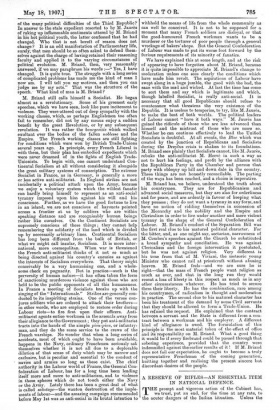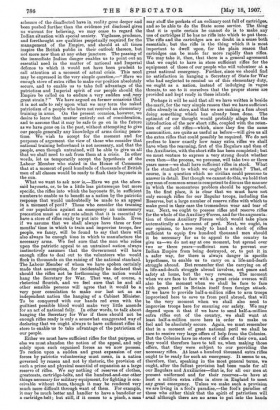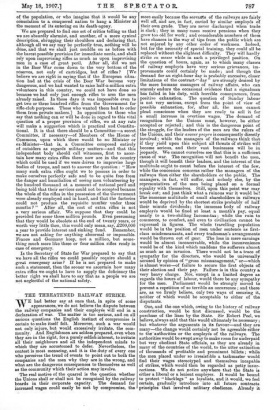A RESERVE OF RIFLES—AN ESSENTIAL ITEM IN NATIONAL DEFENCE.
THEprompt and vigorous action of the Cabinet has, we trust, put an end, for the time at any rate, to the neater dangers of the Indian kituation. Unless the
schemes of the disaffected have in reality gone deeper and been pushed further than the evidence yet disclosed gives us warrant for believing, we may cease to regard the Indian situation with special anxiety. Vigilance, prudence, and forethought are qualities perpetually required for the management of the Empire, and should at all times inspire the British public in their outlook thereon, but not more now than at any other juncture. The passing of the immediate Indian danger enables us to point out an essential need in the matter of national and Imperial defence to which it would not have been prudent to call attention at a moment of actual crisis. This need may be expressed in the very simple question,—" Have we enough store of extra rifles to make our position absolutely secure, and to enable us to take full advantage of the patriotism and Imperial spirit of our people should the Empire 'be called on to endure a very sudden and ,very great strain ? " We have argued on former occasions that it is not safe to rely upon what we may term the naked patriotism of a people who have not received an elementary training in arms. On the present occasion, however, we desire to leave that matter entirely out of consideration, and to assume that it may be safe to go on in the future as we have gone on in the past, without attempting to give our people generally any knowledge of arms during peacetime. We wish to wept for the moment and for purposes of argument the view of those who consider that national training beforehand is not necessary, and that the people, even though untrained, will be able to give us all that we shall need to ask from them at a crisis. In other words, let us temporarily accept the hypothesis of the Labour Member who stated in the House of Commons that at a moment of peril hundreds of thousands of British men of all classes would be ready to flash their bayonets in the sun.
What we want to ask now is,—Have we got the aforesaid bayonets, or, to be a little less picturesque but more specific, the rifles into which the bayonets fit, in sufficient numbers to enable us to benefit as a nation by the patriotic respenv that would undoubtedly be made to an appeal in a moment of peril ? Those who consider the training of our population against an emergency an unnecessary precaution must at any rate admit that it is essential to have a store of rifles ready to put into their hands. Even if we assume that we shall always have three or four months' time in which to train and improvise troops, few people, we fancy, will be found to say that there will also always be enough time in which to manufacture the necessary arms. We feel sure that the man who relies upon the patriotic appeal to an untrained nation always instinctively assumes that the Government will have enough rifles to deal out to the volunteers who would flock in thousands on the raising of the national standard. The Labour Member of whom we have spoken certainly made that assumption, for incidentally he declared that should the rifles not be forthcoming the nation would hang the Secretary for War. That was, of course, a rhetorical flourish, and we feel sure that he and all other sensible persons will agree that it would be a very poor consolation to make our last act as an independent nation the hanging of a Cabinet Minister. To be conquered with our hands red even with the guiltiest possible blood would make very little amends for an act of national folly. In other words, to talk about hanging the Secretary for War if there should not be enough rifles ready is only a somewhat exaggerated way of declaring that we ought always to have sufficient rifles in store to enable us to take advantage of the patriotism of our people.
Either we must have sufficient rifles for that purpose, or else we must abandon the notion of the appeal, and rely solely upon such organised forces as we now possess. To reckon upon a sudden and great expansion of our forces by patriotic volunteering must mean, in a nation governed by reason and not by rhetoric, the provision of such a prime and physical essential of expansion as a large reserve of rifles. We say nothing of reserves of clothes, greatcoats, cartridge-belts, and the hundred-and-one other things necessary for military equipment, for fighting is conceivable without them, though it may be rendered very much more difficult through want of them. For example, it may be much better and handier to have a bandolier or a cartridge-belt; but still, if it comes to a pinch, a man may stuff the pockets of au ordinary coat full of cartridges, and so be able to do the State some service. The thing that it is quite certain he cannot do is to make any use of cartridges if he has no rifle into which to put them. The rifle and the cartridges are no doubt in a' sense both essentials ; but the rifle is the thing which it is most important to dwell upon, for the plain reason that cartridges can be made far more rapidly than rifles, We may take it, then, that there is a general agreement that we ought to have in store sufficient rifles for the equipment of those of our people who will volunteer at a great national emergency. Further, since we should find no satisfaction in hanging a Secretary of State for War who had neglected to remind us of this elementary duty, we ought as a nation, instead of indulging in vague threats, to see to it ourselves that the proper stores are provided and kept ready in these islands.
Perhaps it will be said that all we have written is beside the mark, for the very simple reason that we have sufficient, rifles already in store, and that we are making a fuss about doing something which has already been done. The optimist of our thought would probably allege that the introduction of the new short rifle, coupled with the retention of our old rifles—which, since they fire the same ammunition, are quite as useful as before—will give us all the extra rifles that could possibly be required. We ao not profess to know exactly how Many extra rifles we shall have when the rearming, first of the Regulars and then of the Auxiliaries, with the short rifle has been completed ; but we must venture to express a very strong doubt whether even then—the process, we presume, will take two or three years more—we shall have sufficient rifles in stock. What is the standard to which we ought to attain ? That, of course, is a question which no civilian could presume to answer in detail. But though we cannot do this, we hold that any man of common-sense is competent to discuss the manner in which the momentous problem should be approached. In the first place, it is clear that we must have not only enough rifles for our Regular troops, including the Reserves, but a large number of reserve rifles with which to make good in their case the tremendous wear and tear of war. Next, we ought to possess rifles and reserve rifles; for the whole of the AuxiliaryPorces, and for the augmentation of those Auxiliary Forces which would take place automatically at a moment of peril. Next, we ought, in our opinion, to have ready to hand a stock of rifles sufficient to equip five hundred thousand men should it be necessary for us to appeal to the country to give us—we do not say at one moment, but spread over two or three years—sufficient men to prevent our Indian Empire from being destroyed, or, to put it in a safer way, for there is always danger in specific hypotheses, to enable us to carry on a life-and-death struggle abroad. But remember that the carrying on of a life-and-death struggle abroad involves, not peace and safety at home, but the very reverse. The moment when we are face to face with a great crisis oversee will also be the moment when we shall be face to face with great peril in Britain itself from foreign attack. If we have to provide half-a-million rifles to arm troops improvised here to save us from peril abroad, that will be the very moment when we shall also need to improvise troops here for ensuring our safety. We may depend upon it that if we have to send half-a-million extra rifles out of the country, we shall want at least half-a-million more here in order to make us feel and be absolutely secure. Again, we must remember that in a moment of great national peril we shall be sure to receive very large offers of help Irons the Colonies. But the Colonies have no stores of rifles of their own, and they would therefore have to tell us, when making those offers, that they were subject to our providing the necessary rifles. At least a hundred thousand extra rifles ought to be ready for such an emergency. It seems to us, therefore, that, speaking in the most general terms, we ought, after the fullest provision had been made for all our Regulars and Auxiliaries—that is, for all our men at present uniformed and for their reserves—to have at least a million extra rifles in store in England .to meet any great emergency.. Unless we make such a provision we are living in a fool's paradise,—the fool's paradise of those who either think that the spirit of patriotism will. avail although there are no arms to put into the hands of the population, Or who iniagirie that it would be any consolation to a. conquered nation to hang a Minister at the moment of its entering on its death-agony.
We are prepared to find one set of critics telling us that we are absurdly alarmist, and another, of a more cynical description, shrugging their shoulders and declaring that, although all we say may be perfectly true, nothing will be done, and that we shall just muddle on as before with the barest possible provision for immediate needs, and shall rely upon improvising rifles as much as upon improvising men in a case of great peril. After all, 'did we not in the Boer War come down to the very bottom of the reserves, not only of cartridges, but of rifles ? [We believe we are right in saying that if the European situation had at the crisis of the Boer War become very dangerous, and we had wanted to raise half-a-million extra velunteers in this country, we could not have done so because we had only just enough rifles to arm the men already raised. In those days it was impossible even to get two or three hundred rifles from the Government for rifle-club purposes. Those who wanted them had to order them from private makers.] In opposition to those who say that nothing can or will be done in regard to this vital qUestion of a proper provision of rifles, we at any rate will make a suggestion which is practical and Constitutional. It is that there should be a Committee—a secret Committee, if necessary—of Members of the House of Commons,upon which there would be no Minister or ex-Minister—that is, a Committee composed entirely of outsiders as regards military matters—and that this independent body should call witnesses, first to ascertain how many extra rifles there now are in the country which could be used if we were driven to improvise large bodies of troops, and next to answer the question : "How many such extra rifles ought we to possess in order to make ourselves perfectly safe and to be quite free from the danger and humiliation of seeing men volunteering by the hundred thousand at a moment of national peril and being told that their services could not be accepted because the whole of the rifles in the possession of the Government were already employed and in hand, and that the factories could not produce the requisite nuinber under thred months ? " After all, the cost of extra rifles is not a very serious affair. We suppose that they could be provided for some three million pounds. Even presuming that they would be obsolete at the end of twenty years, or worth very little then, this would only mean, say, X200,000 a year to provide interest and sinking fund. Remember, we are not asking for anything abnormal or impossible. Fiance and Germany keep, not a million, but some. thing much more like three or four million rifles ready in case of emergency.
Is the Secretary of State for War prepared to say that we have all the rifles we could possibly require should a great emergency arise ? If he is not prepared to make such a statement, then the sooner we ascertain how many extra rifles we ought to have to supply the deficiency the better right we shall have to say that as a people we are not neglectful of the national safety.








































 Previous page
Previous page